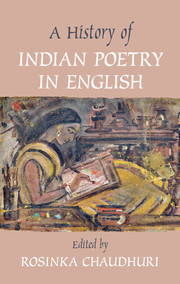Book contents
- Frontmatter
- Contents
- Contributors
- Acknowledgments
- Introduction
- SECTION I THE BROAD NINETEENTH CENTURY: INDIANS IN ENGLISH AND THE ENGLISH IN INDIA
- SECTION II PUBLISHERS, PUBLISHING HOUSES, AND THE PERIODICAL PRESS
- SECTION III POETRY: 1950–2000
- 13 Nissim Ezekiel: Poet of a Minor Literature
- 14 Dom Moraes: A Poet's Progress
- 15 Interpretative Testimony: Kamala Das and Eunice de Souza
- 16 Adil Jussawala and the Double Edge of Poetry
- 17 Arvind Krishna Mehrotra and the Interplay of Languages
- 18 Arun Kolatkar: A Singular Poetry in Two Languages
- 19 Imagery and Imagination in the Poetry of Jayanta Mahapatra
- 20 Modernisms and Modernity: Keki Daruwalla and Gieve Patel
- 21 The Third Generation: Melanie Silgardo and Manohar Shetty
- SECTION IV POETS OF THE DIASPORA
- SECTION V THE NEW MILLENNIUM POETS ON THEMSELVES
- Bibliography
- Index
18 - Arun Kolatkar: A Singular Poetry in Two Languages
from SECTION III - POETRY: 1950–2000
Published online by Cambridge University Press: 05 March 2016
- Frontmatter
- Contents
- Contributors
- Acknowledgments
- Introduction
- SECTION I THE BROAD NINETEENTH CENTURY: INDIANS IN ENGLISH AND THE ENGLISH IN INDIA
- SECTION II PUBLISHERS, PUBLISHING HOUSES, AND THE PERIODICAL PRESS
- SECTION III POETRY: 1950–2000
- 13 Nissim Ezekiel: Poet of a Minor Literature
- 14 Dom Moraes: A Poet's Progress
- 15 Interpretative Testimony: Kamala Das and Eunice de Souza
- 16 Adil Jussawala and the Double Edge of Poetry
- 17 Arvind Krishna Mehrotra and the Interplay of Languages
- 18 Arun Kolatkar: A Singular Poetry in Two Languages
- 19 Imagery and Imagination in the Poetry of Jayanta Mahapatra
- 20 Modernisms and Modernity: Keki Daruwalla and Gieve Patel
- 21 The Third Generation: Melanie Silgardo and Manohar Shetty
- SECTION IV POETS OF THE DIASPORA
- SECTION V THE NEW MILLENNIUM POETS ON THEMSELVES
- Bibliography
- Index
Summary
Arun Kolatkar has a singular poetic voice which finds expression in two languages: English and Marathi. All his work has the consistency of an antinomical sensibility: sporadic in print yet prolific in output, casual in manner yet serious in intent, demotic in register yet abstruse in reference, radical in temper yet immersed in tradition. The author was of a piece with his work: genteel in upbringing but subaltern in affiliation, shy in public but bold in practice, a professional publicist but a vocational hermit, urban in habit but solitary by disposition, reticent in company but gregarious among books, indifferent to possessions but caring for the dispossessed.
Kolatkar was a small-town boy who made it good in the big city: from provincial Kolhapur in the south of Maharashtra to the polyglot urban bustle of the metropolis that he knew for most of his active life as Bombay (renamed Mumbai in 1995). He was born in 1931, the eldest of several siblings in a large Hindu Brahmin joint family. His father worked in education. The language spoken at home and around him was Marathi. English would have been taught at school, along with some Sanskrit. Three traits were evident from early youth: an interest in the graphic arts, a passion for eclectic reading, and the temperament of an autodidact who did not take well to authority. This last trait brought him to the J. J. School of Art in Bombay in 1949, against his father's wishes; it also led to an impetuous marriage in 1954.
The determination to study art was interrupted during periods in which the would-be artist traveled restlessly from place to place within Maharashtra. A two-month walking-trip undertaken in 1953, in the company of a friend from art school, led to some misadventures and the earliest poems in English to have survived into print. A second trip proved more fruitful. In December 1964, he visited the village shrine of Jejuri near Pune, accompanied by his brother Makarand, and a friend, Manohar Oak, and wrote a few poems in English soon after the trip, of which all except one were lost; the trip also led, a decade later, to the poems of Jejuri.
- Type
- Chapter
- Information
- A History of Indian Poetry in English , pp. 284 - 298Publisher: Cambridge University PressPrint publication year: 2016

